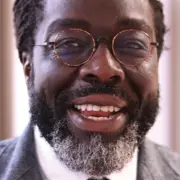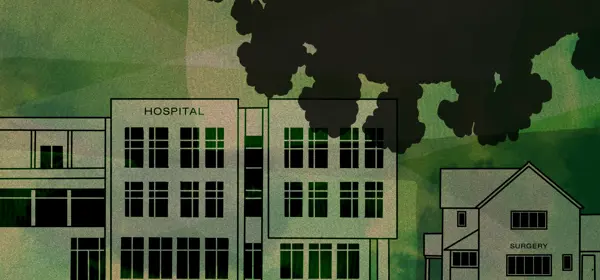
‘An NHS on its knees’
In a health service ravaged by COVID and years of funding cuts, the NHS Confederation chair sets out his priorities
If a week ‘is a long time in politics’, as Harold Wilson once wryly observed, for those involved in healthcare the past few years must often feel like a lifetime.
In the almost four-and-a-half years since he was appointed chair of the NHS Confederation, Lord Victor Adebowale has seen the health service endure a period of unprecedented challenges and change.
Chief among these were the huge pressures and service demands imposed by the pandemic and the bitter disputes between doctors and other healthcare professionals and the Government over improvements to pay and working conditions.
These more recent phenomena came on top of entrenched and long-standing problems in the NHS concerning staffing shortages, year-on-year underfunding and underinvestment in infrastructure, and amid growing levels of inequality and standards of health in society.
In apparent recognition of the scale of these challenges, the new Government commissioned an independent review of NHS performance in England to be overseen by Lord Darzi. His report, published last week, concludes that the NHS is in a critical condition having been battered by a decade of austerity and the demands of the pandemic, and left ‘chronically weakened by a lack of capital investment’ and a demoralised and exhausted workforce.
'Moral harm'
Speaking to The Doctor before publication of the review, Lord Adebowale says he and the Confed welcome it, but stresses he is under no illusions as to the scale of the challenges it is likely to identify.
‘I think the Government has inherited an NHS on its knees no question [and] we need to be honest with the public about what that means,’ he says.
‘We have had year on year of effectively flat cash, which means cuts, [and] that has affected everything and everybody. We had COVID which caused a lot of pain and anguish and moral harm.
‘We have a waiting list, which is historically large, we have staff at all levels that are stressed and overworked and we have clinicians who feel that they are at the end of their tether. All this is underlined by an increasing demand [for services], our aging population, multiple morbidities and the gap between rich and poor going in the wrong direction.’
It is perhaps no coincidence that many of the challenges facing the NHS and the health of those it serves were among Lord Adebowale’s priorities when assuming his role as chair, notably tackling inequality in healthcare and improving access to services.
We have staff at all levels that are stressed and overworked
Lord Victor Adebowale
Stressing that while there is no single solution that will solve the current shortcomings, Lord Adebowale’s belief is that moving towards a preventive model of care through greater integration of services should be the ultimate goal, with government collaboration with ICSs (integrated care systems) critical to this.
To this end he says he feels there has been encouraging early signs from health secretary Wes Streeting, but that actions rather than words will ultimately be what matter. ‘We have to attack this challenge at both ends [and] see it as a system challenge within which no one solution but a series of interventions which move the NHS into a more efficient position where we are preventing the illness,’ he says.
‘To do that we need structures which enable us to understand population health, so we can commission services will move the needle away from the inverse care law and bend the demand curve. I can’t imagine there are structures that can do that better than ICSs and ICBs [integrated care boards].
‘If you look at places like West Yorkshire, there are already green shoots there with the Prevention Agenda, which we should be watering, nurturing, fertilising and encouraging.’
Unacceptable outcomes
Inequality in health outcomes in the NHS and the role racism plays in this, is something which has been a focus for Lord Adebowale even before taking on his role as chair at the Confed.
Together with colleagues he helped establish the NHS WRES (Workforce Race Equality Standard) and the RHO (Race and Health Observatory) and was the keynote speaker at the BMA patient liaison group symposium, which this year focused on inclusivity and intersectionality in health policy.
Lord Adebowale says that, while he believes the WRES and RHO have and will continue to make a positive difference, he has often felt frustrated at the slow pace at which progress is being made.
‘The fact that pain medicine is likely to be administered poorly if you’re black, or the fact that, if you are a black woman, you have a greater chance of dying in childbirth, these are utterly unacceptable and yet have been accepted and been part of the norm in healthcare for many, many years,’ he says. ‘What the RHO does is hold up a mirror to the NHS and say: “Hang on a minute, you know this is happening you can’t just ignore it.”’
Vulnerable tech
The issue of data in healthcare, particularly regarding expanding digitisation of services and patient records, and the increasing role of artificial intelligence, is something which is gaining prominence in discussions around the future delivery of care.
While there is considerable excitement around the potential benefits of these emerging technologies, there is also concern with risks to the safety and integrity of patient data, something which was starkly illustrated earlier this year following a ransomware cyber-attack on NHS services in South London.
As the co-founder of a digital company which seeks to provide connectivity across healthcare, Lord Adebowale says ensuring digital services are prioritised to meet the needs of patients rather than companies designing them is vital. He would ultimately like to see the formation of a ‘NICE-type body’ tasked with registering and overseeing the apps and algorithms ‘used within the context of NHS applications’.
‘How we manage digital in such a way that it is meeting our needs, as opposed to the needs of investors, I think is a really big challenge and I don’t think we’ve got there yet,’ he says.
‘We need to build the public’s trust in the use of their data and people need to see that data, their personal data, is actually benefiting them and not just being used to make some person who believes in breaking things and getting rich richer.’
We have had year on year of effectively flat cash, which means cuts
Lord Victor Adebowale
The issue of money and specifically NHS capital funding, which the Confed believes needs to ultimately be increased to £14bn a year, is perhaps the biggest obstacle to the improvements those such as Lord Adebowale would wish to see realised.
One change he would like to see, however, is a reversal of the narrative borne out of the many years of austerity during the Cameron Conservative Government, that a strong economy must precede a strong NHS.
‘There is no wealth without health,’ he says.
‘[As a nation] we have a significant productivity challenge caused by the fact that we’ve got people who are ill and on the waiting list and usually require someone to look after them who also can’t work.
‘For every one pound we spend on health, we get three pounds back to the economy. So, this is investment, this isn’t burning money, which is, I think, a quite erroneous notion that somehow spending on health is wasted. I consider it’s probably the best value that government, society can spend.’


